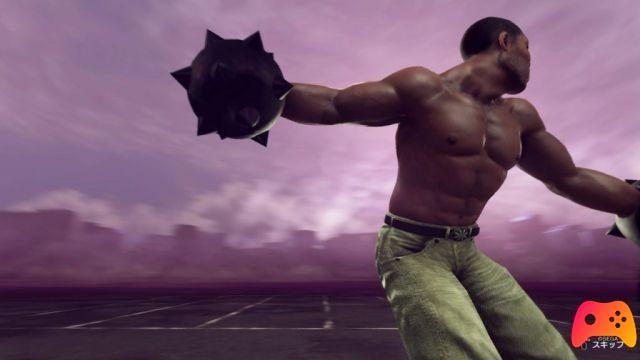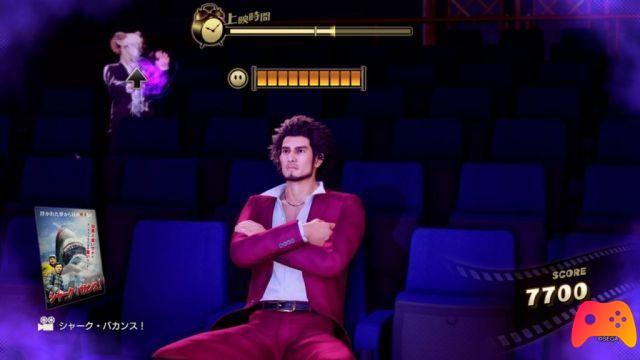
On the occasion of the release of the Japanese demo of Yakuza: Like a Dragon, we tried the new, revolutionary (for the series at least) title from RGG studios. After almost 5 hours of dissecting every single content available in the demo, we can tell you how this seventh chapter has what it takes to be one of the games of the generation. As you may well know by now, we particularly like the JRPG genre. So when RGG studios announced that Yakuza: Like a Dragon would be taking on a turn-based combat system, we immediately greeted the change with interest, although there was no shortage of perplexities. A new title, in the hands of a competent team belonging to a genre that, unfortunately, does not have a great following in the West, is something to celebrate; however Yakuza has always had as its strong point its being an evolution of another not very popular but incredibly precious genre: the beat'em up.
Summing it up in advance, it might be worse to lose the one beat'em up left than having another potentially great JRPG. The Japanese RPG in fact continues to have excellent exponents today, such as the excellent Legend of Heroes, which recently launched one of its best chapters in Trails of Cold Steel III, or the more popular Persona; while the beat'em up remains more relegated to an indie publication, certainly respectable, but without major exponents outside of Rivet City Girls.
However, this premise totally collapsed when we were able to actually put our hand on the gameplay designed for Yakuza - Like a Dragon. As much as we regret the loss of beat'em up, the gameplay devised by RGG studios is something unique and magnificent, which brings together the exceptional base of Dragon Quest XI, the character customization of titles like Final Fantasy X-2 and the interaction with characters, environment and arenas from previous Yakuza titles.

You are surely wondering how it is possible to combine such different elements in a winning mix; and in this preview of Yakuza: Like a Dragon we will do our best to show you the genius of RGG studios. Although the study of the definitive gameplay will be postponed to the western release of the title, from the demo you can already discern the basics of the combat system and… there is a lot to say. The combat system is, as mentioned before, turn-based. However, to be controlled by turns will be only the ability to attack, use objects or flee. The characters will not be stationary on the screen, but they will continuously move, fall after attacks, break objects in the arena etc ...
This becomes important when discussing the gameplay because it is not just a visual feature as in the aforementioned Final Fantasy X-2 or in Final Fantasy XIII, but it composes a game mechanic that integrates the elements of the old Yakuza in Like to Dragon. In fact, based on the position of the enemy in the arena and his physical situation, it will be possible to perform different actions, or take advantage of bonus critical damage. If an enemy is on the ground after an attack and you are quick enough, you can hit them before they get up and inflict insured critical; if an enemy is near an object such as a bicycle or a traffic cone, special attacks can be made and so on.

Even the iconic Heat Moves are retained, complete with QTE when used, and replace the magic of a classic Dragon Quest. This interactive system, integrated with the very solid core gameplay of Dragon Quest (which we continue to mention not surprisingly), make up an extremely solid gaming experience, in which the battles are constantly fast and fun. Unlike other exponents of the genre, even of excellent titles such as the previously mentioned Legend of Heroes, Yakuza: Like a Dragon doesn't need a "turbo mode", as battles are smooth and fast and the lack of casual encounters prevents the game from becoming cloying.
What we hope SEGA will improve is the exploration-to-battle transition, which has a micro-loading like in Yakuza titles prior to the introduction of Dragon Engines. As much as we understand the reason for this choice of programming (the characters change appearance in battle), we do not consider a more fluid integration of the battles impossible, similar to what we saw in the mediocre but functional Caligula Effect.

Character customization is another element we loved in Yakuza - Like a Dragon. In fact, there is an interchangeable job system for each of the 4 party components, which allows you to create interesting combinations even with the few classes present in the demo. Note how these classes are perfectly integrated into the story, in full Yakuzian trash style, but we will talk about this in a separate section. Classes can only be changed out of battle, unlike in Final Fantasy X-2, however they all have their own uses and experimenting with them is satisfying.
Unfortunately, however, Yakuza - Like a Dragon also inherits a mechanic not very comfortable from the pioneers of the Job System; that is, the separation between Character Level or character level, and Job level, or class level. This leads to experimentation not being able to express itself at its best, since it is not clear from the beginning which jobs can be parametrically suitable for the final build

Despite the change in genre, Yakuza - Like a Dragon presents itself as a very worthy sequel to Yakuza 6 (after all in Japan it is called Yakuza 7), and brings all the elements. The change of gender is contextualized through the passion of the protagonist Ichiban for Dragon Quest, and as the previous titles represented the world seen from the eyes of the various protagonists, this new game does the same, but starting from the most atypical eyes. The in-game sounds are reminiscent of dragon quests, with small fanfare at the end of each mission, upon finding each drop, or at level up.
However, the title remains a Yakuza in all respects, with dozens of secondary content, lots of comic substories and above all the return of the beloved karaoke, absent in Judgment. The secondary activities are very different from those seen in previous Yakuza, also thanks to the change of setting, and include a hilarious Kart game mixed between Mario Kart and Burnout and a mini game of garbage collection reminiscent of Pacman. Unfortunately there were other activities in the demo but they were blocked behind the purchase (and release) of the full title.

The secondary contents, as per tradition, are integrated with the characterization of the character, and will show a less visible side during the plot. However Ichiban is a very playful character even during the main narrative, unlike Kiryu who knows how to be a piece of marble when needed, and through this essence of "nerdy nerd star", RGG studios justified the turn-based combat, which is said it is only Ichiban's imagination and the Job system, which is nothing more than an employment agency. Unfortunately, if there is one part that we cannot go into further, it is the narrative, as the demo is very short.
However we can confirm how the Dragon Engine is very beautiful aesthetically, while disfiguring in a post-Death Stranding world, and how the direction of Yakuza - Like a Dragon remains of the highest level, equaled by a few geniuses in the world of video games.

Yakuza - Like a Dragon fully convinced us, despite the seemingly unfortunate change in gameplay. RGG Studios is bringing an unexpected wave of originality to the JRPG genre, and we can't wait to have the complete product in hand. To those who appreciated the change we say: wait for it with trepidation, RGG Studios has everything under control, while for the skeptics we recommend trying it, if you can also use it in Japanese, because pad in hand is extremely satisfying. And what do you expect from this new work of the Yakuza universe?
► Yakuza: Like a Dragon is an RPG type game developed by Ryu ga Gotoku Studio and published by Sega for PlayStation 4, PC, Xbox One, Xbox Series X and PlayStation 5, the video game was released on 13/11/2020
Will come out for PlayStation 5 il 02/03/2021
Version for Xbox Series X from 31/12/2020
Deprecated: Automatic conversion of false to array is deprecated in /home/epictrick.com/htdocs/php/post.php on line 612






